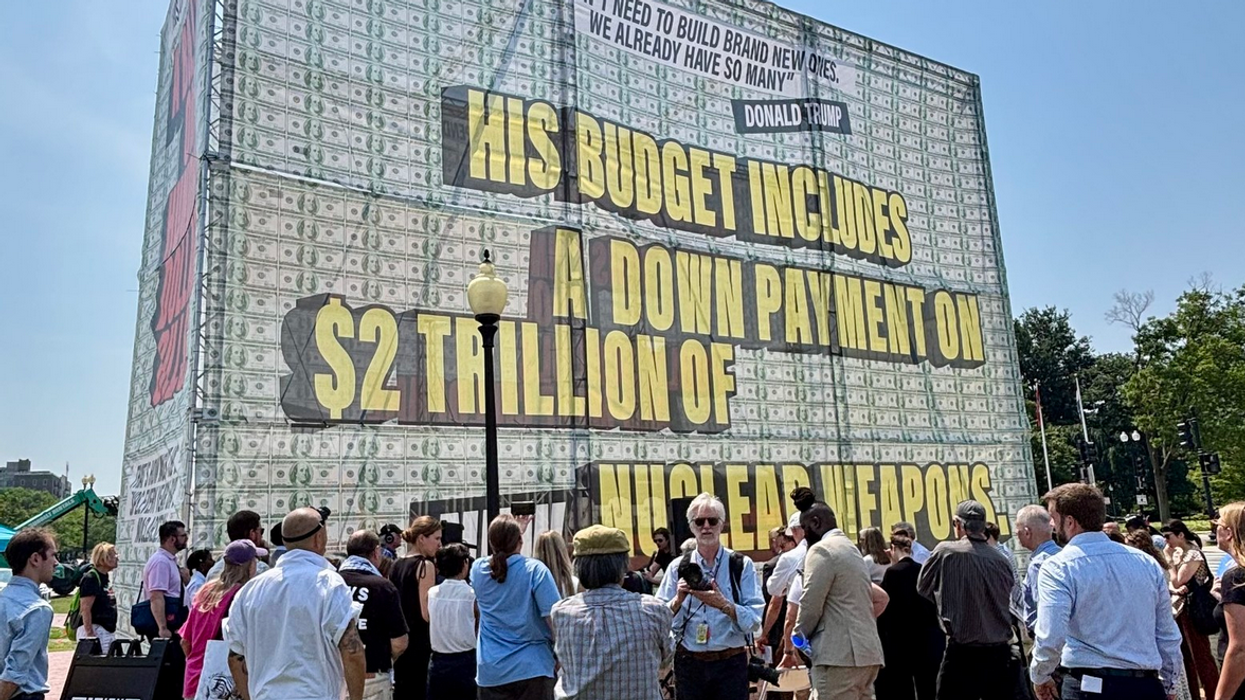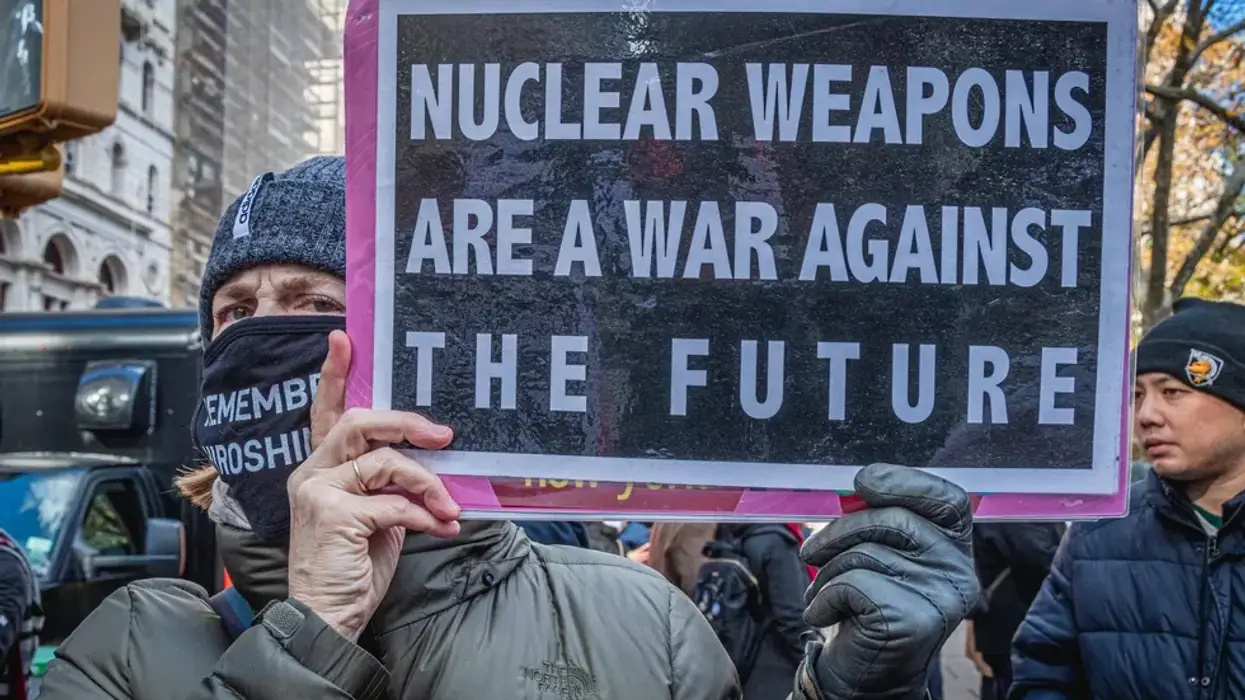“Sumie was crying,” he recalled. “She said to me, ‘Daddy, it’s hot! The fire is coming! My hands are burning!’ There was a final scream, and then I couldn’t hear her voice anymore.”
Sumie and her hours-old sister—who was never given a name—were among the estimated 23,000 children killed in the U.S. atomic bombing of Hiroshima 80 years ago this week. A further 15,000 perished in the attack on Nagasaki three days later.
“She said to me, ‘Daddy, it’s hot! The fire is coming! My hands are burning!’ There was a final scream, and then I couldn’t hear her voice anymore.”
Their deaths, and those of tens of thousands of other civilians, challenge official narratives in the West that the use of nuclear weapons against the two Japanese cities in the final days of World War II was morally justified.
 It is believed that this photo was taken one day before the Hiroshima bombing. Five-year-old Wataoka Hirono (right) and her two-year-old sister, Kimino (right), were both killed. (Photo courtesy of Iwata Miho)
It is believed that this photo was taken one day before the Hiroshima bombing. Five-year-old Wataoka Hirono (right) and her two-year-old sister, Kimino (right), were both killed. (Photo courtesy of Iwata Miho)
A new poll by the Pew Research Center shows that U.S. public support for the attacks is declining. In 1945, it was as high as 85 percent. Today, only around 35 percent of Americans believe their government’s actions were justified, with 31 percent believing they weren’t. The other third are unsure.
…
With few exceptions, those who survived the atomic bombings and are still alive were children at the time. Through their young eyes, they witnessed unimaginable horror. Known in Japanese as hibakusha, many have devoted their lives to the cause of nuclear disarmament, sharing their first-hand testimonies time and again in the hope of avoiding a recurrence of such tragedies. Their warning is stark: humanity and nuclear weapons cannot coexist.
Last December, their efforts were recognized with the Nobel Peace Prize awarded to Nihon Hidankyo, or the Japan Confederation of A- and H-Bomb Sufferers Organizations.
Their warning is stark: humanity and nuclear weapons cannot coexist.
Many of the survivors lost their parents, siblings, and friends. They have suffered lifelong physical and psychological trauma. Some have endured multiple surgeries to treat painful keloid scars, extract glass fragments embedded deep in their bodies, or remove cancers caused by their exposure to the bombs’ radiation.
 Three-year-old Tetsutani Shinichi (right) was killed in the Hiroshima bombing while doing what he loved most: riding his tricycle. His seven-year-old sister, Michiko (left), and their baby sister, Yoko, were also killed. (Photo courtesy of the Tetsutani family)
Three-year-old Tetsutani Shinichi (right) was killed in the Hiroshima bombing while doing what he loved most: riding his tricycle. His seven-year-old sister, Michiko (left), and their baby sister, Yoko, were also killed. (Photo courtesy of the Tetsutani family)
In a nuclear attack, children are especially vulnerable, as their skin is more delicate and their bodies frailer, and they have more cells that are growing and dividing rapidly and thus more susceptible to radiation effects. They are significantly more likely than adults to die from burns, blast injuries, and acute radiation sickness.
As the late paediatric endocrinologist Michael S. Kappy explained in a 1984 paper, “Children and adults do not share equally the dreadful short-term effects of ‘the bomb’, and it is clear from all available data that children are also most susceptible to the long-term effects that appear after varying latency periods.”
The disproportionate impact of nuclear weapons on infants and children was underscored in a declaration adopted this March by the 73 countries that have so far ratified or acceded to the landmark 2017 Treaty on the Prohibition of Nuclear Weapons.
In a nuclear attack, children are especially vulnerable, as their skin is more delicate and their bodies frailer, and they have more cells that are growing and dividing rapidly and thus more susceptible to radiation effects.
The fact that children would suffer the greatest harm of all in the event of a nuclear attack against a city today should have profound implications for policy-making in nuclear-armed states and spur action for disarmament. Yet, all nine such states continue to act contrary to that objective. And the risk of a nuclear weapon being used again appears to be at an all-time high.
…
In Hiroshima, thousands of school students were outdoors creating firebreaks on the morning of the atomic bombing. Completely unshielded from the bomb’s effects, they stood little chance of survival. The mortality rate for those within one kilometre of the hypocentre was around 94 percent. Approximately 6,300 of them died.
Many parents spent days or weeks searching for their missing children in the aftermath. For some, not knowing their children’s fate became unbearable. One mother in Hiroshima, refusing to accept her daughter’s death, kept a door or window open for the rest of her life in case she one day returned home.
 Suzuki Kimiko (left) and her elder brother, Hideaki (right), in Hiroshima a few years before the bombing. Both were killed, along with two other siblings. Their father, Rokuro, was a keen photographer. (Photo courtesy of Suzuki Tsuneaki)
Suzuki Kimiko (left) and her elder brother, Hideaki (right), in Hiroshima a few years before the bombing. Both were killed, along with two other siblings. Their father, Rokuro, was a keen photographer. (Photo courtesy of Suzuki Tsuneaki)
Some parents managed to identify the charred, swollen bodies of their children among scores of corpses only by the name tags on their clothes. Others found their children alive and nursed them for days, weeks or months until they took their final breaths. More than a few expressed guilt at the inadequacy of their care amid extreme shortages of medicines and food.
In Nagasaki, one mother watched as four of her children succumbed to acute radiation poisoning one after another. “I kept thinking that human beings shouldn’t die so easily,” she reflected.
Another Nagasaki mother’s face was so badly burnt and disfigured in the attack that her grievously injured two-year-old son couldn’t recognize her as she cared for him in his dying moments.
Some children appeared unharmed at first, having sustained no burns or other visible injuries, but developed fatal diseases years later, as ionizing radiation had entered their bodies and altered their cells.
 All four members of the Miyazaki family in this photo were killed in the Nagasaki bombing: eight-year-old Yuji (centre rear), five-year-old Tsuneji (right), three-year-old Yasuko (centre front) and their mother, Tsuneko. (Photo courtesy of Saito Takeo)
All four members of the Miyazaki family in this photo were killed in the Nagasaki bombing: eight-year-old Yuji (centre rear), five-year-old Tsuneji (right), three-year-old Yasuko (centre front) and their mother, Tsuneko. (Photo courtesy of Saito Takeo)
One such child was Sadako Sasaki, a toddler at the time of the Hiroshima bombing. She died a decade later from acute malignant lymph gland leukemia. During her hospitalization, she folded over a thousand paper cranes with her weak and skinny arms in the hope it would bring her good health.
“Until her very last moment, she held onto her wish and made a great effort to survive,” her father remembered. “I loved her so much that I couldn’t come to terms with her death for a long time.”
Sadako’s tragic story continues to inspire children in Japan and throughout the world to work for the abolition of nuclear weapons—an increasingly urgent task given deteriorating relations among nuclear-armed states and the enhancement and expansion of their arsenals.
It is estimated there are more than 12,000 nuclear weapons in the world today, most of them vastly more powerful than the atomic bombs dropped eight decades ago. In the words of the UN Secretary-General, António Guterres, “They offer no security—just carnage and chaos. Their elimination would be the greatest gift we could bestow on future generations.”



 It is believed that this photo was taken one day before the Hiroshima bombing. Five-year-old Wataoka Hirono (right) and her two-year-old sister, Kimino (right), were both killed. (Photo courtesy of Iwata Miho)
It is believed that this photo was taken one day before the Hiroshima bombing. Five-year-old Wataoka Hirono (right) and her two-year-old sister, Kimino (right), were both killed. (Photo courtesy of Iwata Miho) Three-year-old Tetsutani Shinichi (right) was killed in the Hiroshima bombing while doing what he loved most: riding his tricycle. His seven-year-old sister, Michiko (left), and their baby sister, Yoko, were also killed. (Photo courtesy of the Tetsutani family)
Three-year-old Tetsutani Shinichi (right) was killed in the Hiroshima bombing while doing what he loved most: riding his tricycle. His seven-year-old sister, Michiko (left), and their baby sister, Yoko, were also killed. (Photo courtesy of the Tetsutani family) Suzuki Kimiko (left) and her elder brother, Hideaki (right), in Hiroshima a few years before the bombing. Both were killed, along with two other siblings. Their father, Rokuro, was a keen photographer. (Photo courtesy of Suzuki Tsuneaki)
Suzuki Kimiko (left) and her elder brother, Hideaki (right), in Hiroshima a few years before the bombing. Both were killed, along with two other siblings. Their father, Rokuro, was a keen photographer. (Photo courtesy of Suzuki Tsuneaki) All four members of the Miyazaki family in this photo were killed in the Nagasaki bombing: eight-year-old Yuji (centre rear), five-year-old Tsuneji (right), three-year-old Yasuko (centre front) and their mother, Tsuneko. (Photo courtesy of Saito Takeo)
All four members of the Miyazaki family in this photo were killed in the Nagasaki bombing: eight-year-old Yuji (centre rear), five-year-old Tsuneji (right), three-year-old Yasuko (centre front) and their mother, Tsuneko. (Photo courtesy of Saito Takeo)
